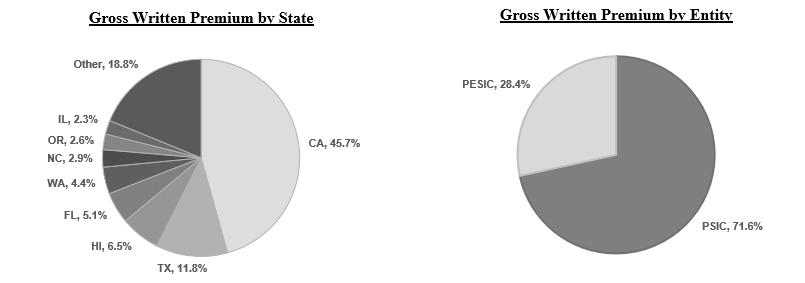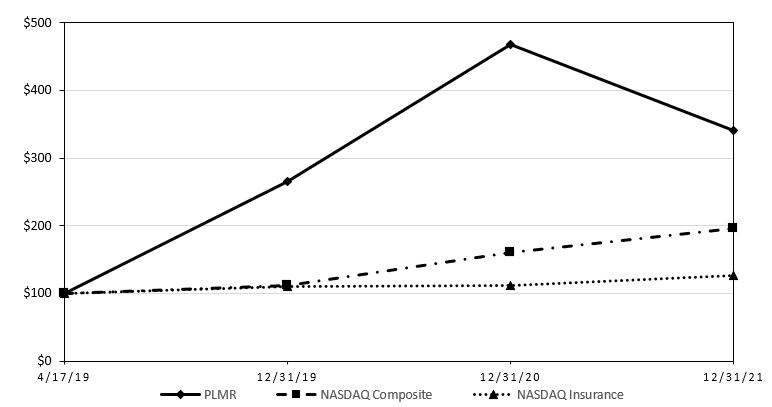The failure of our information technology and telecommunications systems could adversely affect our business.
Our business is highly dependent upon our information technology and telecommunications systems, including our underwriting system. We rely on these systems to interact with brokers and insureds, to underwrite business, to prepare policies and process premiums, to perform actuarial and other modeling functions, to process claims and make claims payments, and to prepare internal and external financial statements and information. Some of these systems may include or rely on third-party systems not located on our premises or under our control. Events such as natural catastrophes, pandemics (including the COVID-19 Pandemic), cyber-attacks, terrorist attacks, industrial accidents or computer viruses may cause our systems to fail or be inaccessible for extended periods of time. While we have implemented business contingency plans and other reasonable plans to protect our systems, sustained or repeated system failures or service denials could severely limit our ability to write and process new and renewal business, provide customer service, pay claims in a timely manner or otherwise operate in the ordinary course of business.
A significant portion of our employees work remotely and outside of our primary offices on a regular basis. We believe remote work increases the need for our information technology and telecommunications systems to work properly and creates additional operational risk and difficulty should these systems fail.
Security breaches or cyber-attacks could expose the Company to liability and damage its reputation and business.
Our operations depend on the reliable and secure processing, storage, and transmission of confidential and other data and information in our computer systems and networks. Computer viruses, hackers, employee misconduct, and other external hazards could expose our systems to security breaches, cyber-attacks or other disruptions.
Cyberthreats are constantly evolving and becoming increasingly sophisticated and complex, making it increasingly difficult to detect and successfully defend against them. In addition, cyber-attackers (which may include individuals or groups, as well as sophisticated groups such as nation-state and state-sponsored attackers, which can deploy significant resources to plan and carry out exploits) also develop and deploy viruses, worms, credential stuffing attack tools and other malicious software programs, some of which may be specifically designed to attack our products, information systems or networks. Outside parties have in the past and may in the future attempt to fraudulently induce our employees or users of our products or services to disclose sensitive, personal or confidential information via illegal electronic spamming, phishing or other tactics.
While we have implemented security measures designed to protect against breaches of security and other interference with our systems and networks, our systems and networks may be, and at times are, subject to breaches or interference. Any such event may result in operational disruptions as well as unauthorized access to or the disclosure or loss of our proprietary information or our customers’ data and information, which in turn may result in legal claims, regulatory scrutiny and liability, reputational damage, the incurrence of costs to eliminate or mitigate further exposure, the loss of customers or affiliated advisors, reputational harm or other damage to our business. While we maintain insurance coverage that may, subject to policy terms and conditions, cover certain aspects of cyber risks, such insurance coverage may be insufficient to cover all losses.
In addition, the trend toward general public notification of such incidents could exacerbate the harm to our business, financial condition and results of operations. Even if we successfully protect our technology infrastructure and the confidentiality of sensitive data, we could suffer harm to our business and reputation if attempted security breaches are publicized. We cannot be certain that advances in criminal capabilities, discovery of new vulnerabilities, attempts to exploit vulnerabilities in our systems, data thefts, physical system or network break-ins or inappropriate access, or other developments will not compromise or breach the technology or other security measures protecting the networks and systems used in connection with our business.
Any cloud provider service failure or control weakness could adversely affect our business.
We employ cloud-based services to host our applications and intend to expand our use. As we expand our use of cloud-based services, we will increasingly rely on third-party cloud providers to maintain appropriate controls and safeguards to protect confidential information we receive, including personal, personally identifiable, sensitive, confidential or



